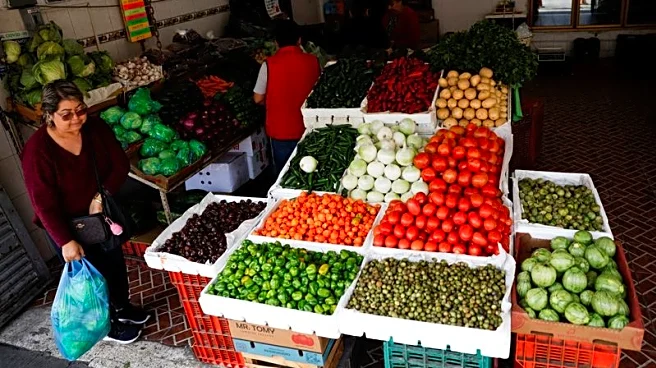What's Happening?
A network of community kitchens in Sudan, which has been a crucial lifeline for millions affected by the ongoing civil war, is on the brink of collapse. According to a report by Islamic Relief, these kitchens,
run by local volunteers, are struggling due to neglect, shortages, and volunteer exhaustion. The conflict, which began over two years ago between the Sudanese army and the paramilitary Rapid Support Forces (RSF), has led to what the UN describes as the world's largest humanitarian crisis. Over 24 million people are facing acute food shortages, with famine conditions confirmed in several conflict zones. The community kitchens, often the only source of food for many, are now at risk of closing within six months if the situation does not improve.
Why It's Important?
The potential collapse of these community kitchens could exacerbate the already dire humanitarian situation in Sudan. With half of the population facing acute food shortages, the closure of these kitchens would leave millions without access to food. The kitchens have been primarily funded by the Sudanese diaspora, especially after cuts in USAID funding, highlighting the financial fragility of these operations. The ongoing conflict and bureaucratic obstacles have further hindered the delivery of aid, making these local initiatives even more critical. The situation underscores the urgent need for international support and intervention to prevent a full-scale famine and further humanitarian disaster.
What's Next?
If the current conditions persist, most community kitchens are expected to close within six months, leaving only a few operational in each area. This would significantly increase the risk of famine in already vulnerable regions. International aid agencies and local volunteers are calling for increased support and resources to sustain these kitchens. The situation also calls for a renewed focus on peace efforts to stabilize the region and allow for the safe delivery of humanitarian aid. The international community's response in the coming months will be crucial in determining the future of these life-saving initiatives.
Beyond the Headlines
The plight of Sudan's community kitchens highlights the broader challenges faced by local humanitarian efforts in conflict zones. These kitchens have been a model for UN-led reforms that emphasize empowering local communities in crisis situations. However, the ongoing conflict and lack of resources have left volunteers vulnerable to burnout and danger. The situation also raises ethical concerns about the international community's responsibility to support local initiatives and ensure the safety of those providing aid. The potential collapse of these kitchens could have long-term implications for Sudan's food security and stability.










